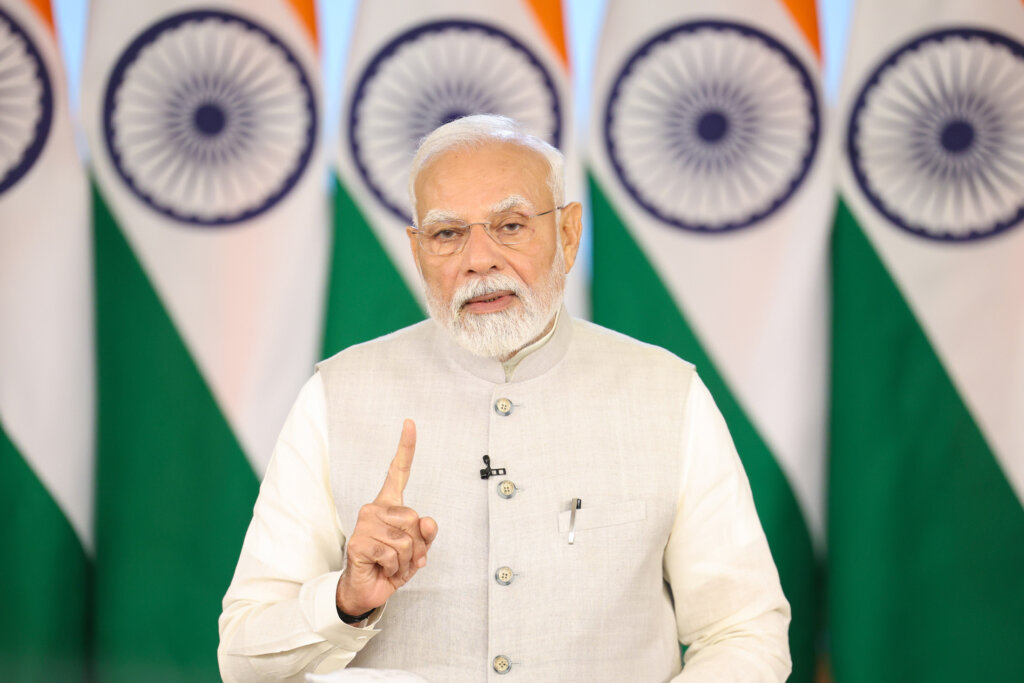
India’s journey into space transcends mere exploration; it embodies a collective spirit of innovation, unity, and empowerment. Prime Minister Narendra Modi emphasizes that space is not just a destination but a declaration of curiosity, courage, and collective progress. Indian rockets carry more than payloads—they carry the dreams of 1.4 billion Indians. The nation’s first human spaceflight mission, Gaganyaan, reflects India’s growing aspirations in space technology. Notably, many of India’s space missions are being led by women scientists, highlighting the nation’s commitment to gender equality and empowerment. India’s space vision is rooted in the ancient philosophy of ‘Vasudhaiva Kutumbakam,’ meaning ‘the world is one family,’ reflecting a commitment to global cooperation and peace.
India’s Space Milestones: A Vision of Unity, Innovation, and Global Leadership
Prime Minister Narendra Modi addressed the Global Conference on Space Exploration (GLEX) 2025 via videoconferencing, highlighting India’s remarkable journey in space exploration. He emphasized that space is not merely a destination but a declaration of curiosity, courage, and collective progress. From launching a small rocket in 1963 to becoming the first nation to land near the Moon’s South Pole, India’s space achievements reflect this spirit.
“Indian rockets carry more than payloads—they carry the dreams of 1.4 billion Indians,” he remarked, underscoring that these advancements are not just scientific milestones but also proof that the human spirit can defy gravity. He recalled India’s historic achievement of reaching Mars on its first attempt in 2014.
The Prime Minister highlighted several key missions:
- Chandrayaan-1: Helped discover water on the Moon.
- Chandrayaan-2: Provided the highest-resolution images of the lunar surface.
- Chandrayaan-3: Furthered understanding of the Moon’s South Pole.
He also pointed out that India developed cryogenic engines in record time, launched 100 satellites in a single mission, and successfully deployed over 400 satellites for 34 nations using Indian launch vehicles.
India’s latest accomplishment—docking two satellites in space this year—was described as a major step forward in space exploration. This feat positions India among an elite group of nations capable of such advanced space operations.
The Prime Minister concluded by reaffirming that India’s space vision is rooted in the ancient philosophy of ‘Vasudhaiva Kutumbakam,’ meaning ‘the world is one family,’ reflecting a commitment to global cooperation and peace.
Prime Minister Narendra Modi reaffirmed that India’s space journey is not about competing with others but about reaching greater heights together. He emphasized the collective goal of exploring space for the benefit of humanity. He highlighted India’s commitment to regional cooperation, recalling the successful launch of a satellite for South Asian nations. He announced that the G20 Satellite Mission, introduced during India’s Presidency, would be a significant contribution to the Global South.
He remarked that India continues to advance with renewed confidence, constantly pushing the boundaries of scientific exploration. “India’s first human spaceflight mission, ‘Gaganyaan,’ reflects the nation’s growing aspirations in space technology,” he pointed out. Shri Modi revealed that, in the coming weeks, an Indian astronaut would travel to space as part of a joint ISRO-NASA mission to the International Space Station.
He further outlined India’s long-term vision, stating that by 2035, the Bharatiya Antariksha Station would facilitate groundbreaking research and international collaboration. He declared that by 2040, an Indian astronaut would leave footprints on the Moon and added that Mars and Venus remain key targets in India’s future space ambitions.
Emphasizing that for India, space is not just about exploration but also empowerment, the Prime Minister highlighted how space technology enhances governance, improves livelihoods, and inspires generations. He noted the vital role of satellites in ensuring the welfare of every Indian, citing their contributions to fishermen alerts, the GatiShakti platform, railway safety, and weather forecasting.
He underscored India’s commitment to fostering innovation by opening its space sector to startups, entrepreneurs, and young minds. He pointed out that India now has over 250 space startups, contributing to advancements in satellite technology, propulsion systems, imaging, and other pioneering fields. “Many of India’s space missions are being led by women scientists,” he proudly acknowledged.
“India’s space vision is rooted in the ancient philosophy of ‘Vasudhaiva Kutumbakam’,” reaffirmed Shri Modi, stressing that India’s space journey is not just about its own growth but about enriching global knowledge, addressing shared challenges, and inspiring future generations. He emphasized India’s commitment to collaboration, stating that the nation stands for dreaming together, building together, and reaching for the stars together. Concluding his remarks, he called for a new chapter in space exploration, guided by science and the collective aspiration for a better future.
